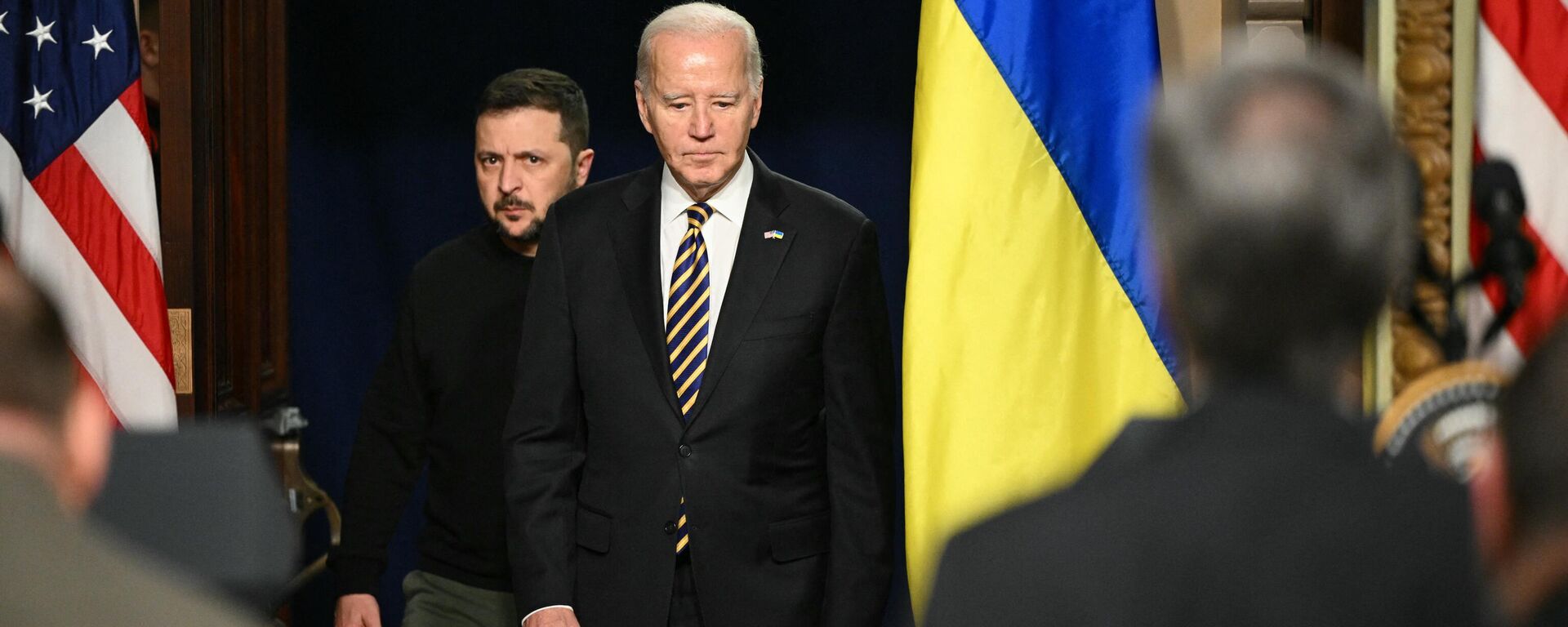https://sputnikglobe.com/20240429/delusional-10-year-ukraine-funding-plan-may-be-straw-that-breaks-us-economic-empires-back-1118180424.html
‘Delusional’ 10-Year Ukraine Funding Plan May Be Straw That Breaks US Economic Empire’s Back
‘Delusional’ 10-Year Ukraine Funding Plan May Be Straw That Breaks US Economic Empire’s Back
Sputnik International
Kiev has revealed that it's negotiating with Washington on an ambitious new assistance package which would provide Ukraine with military, financial and political support into the mid-2030s. Economist and author Dr. Rodney Shakespeare explains why the idea could very well become the straw that broke the US economic empire’s back.
2024-04-29T17:14+0000
2024-04-29T17:14+0000
2024-04-29T17:14+0000
analysis
volodymyr zelensky
americans
ukraine
kiev
washington
nato
https://cdn1.img.sputnikglobe.com/img/106176/34/1061763420_0:180:1920:1260_1920x0_80_0_0_fa49b19ca1c6d09fea654c4f46584010.jpg
Volodymyr Zelensky announced Sunday that Kiev is talking to its American sponsors about securing “specific levels of support for this year and for the next ten years, including military, financial and political support, and joint arms production.”The new bilateral security agreement is expected to be the “strongest” among any similar pacts Kiev has already penned or is planning to sign with other NATO countries, Zelensky added.The contents of the new ten-year draft agreement remain unknown. Negotiations are said to have begun about a week ago. Kiev has already signed a number of largely symbolic multi-year security pacts with several European countries, including the UK, France, Germany and Finland, committing the latter to providing Ukraine with additional military assistance, training support, and other help for the proxy war against Russia.In a surprise visit to Kiev Monday, NATO chief Jens Stoltenberg announced plans for “a major, multi-year financial commitment to sustain our support” at the NATO level, saying allies “have already agreed to a plan for a greater NATO role in coordinating security assistance and training for Ukraine.”The alliance began drawing up plans for a proposed five-year, $100 billion “Trump-proof” military aid package for Kiev in early April, designed to enable the continuation of the conflict with Russia even if former President Donald Trump returns to power and cut off new US assistance to Kiev in a bid to press the latter into negotiations.Sputnik has already analyzed the proposed US multi-year funding package announced by Zelensky from a security standpoint, with former Pentagon analyst David Pyne explaining that the idea may signal that Ukraine’s military is approaching imminent collapse, and that the Zelensky regime is desperately seeking an urgent means to extricate itself from total defeat.But from the economic standpoint too, neither Kiev, nor Washington have the long-term wherewithal to continue the conflict indefinitely, says Dr. Rodney Shakespeare, a visiting professor of binary economics at Trisakti University in Indonesia, and co-founder of the Global Justice Movement.In Ukraine’s case, “the loss of productive assets in east Ukraine, the rapidly weakening military situation, and the dislocations produced by the war mean that the Ukrainian economy is a basket case (which will get worse, if that is possible),” Shakespeare told Sputnik.As far as the US is concerned, it’s necessary to consider both the short term and long term implications, Shakespeare says, noting that the “short term consequences” would largely be political, with the need to forestall a NATO defeat in Ukraine signaling a geopolitical failure.“Put another way, the short-term funding of Ukraine will not make the American economy much worse than it already is. At present, around forty million Americans are on, or below, the poverty level, and millions of Americans are experiencing economic insecurity and a relative weakening of their economic position.”It’s over the long-term perspective that things become more interesting, the academic says, pointing out that while Ukraine alone is not enough of a spending priority to collapse the US political class’s drive for global hegemony, Ukraine in combination with other factors could ultimately become the breaking point for the American Empire.“There will soon be a huge geopolitical shock when Ukraine collapses and economic realities in the US will come home to roost,” the economist predicted, noting that unfortunately, the Biden administration and the entire political class has “deluded” themselves into thinking “that the US economy is prosperous” while ignoring the growing chasm between rich and poor, and the “disgraceful condition” of public infrastructure.And that's not to mention the US’s $34 trillion in public debt -- which JPMorgan CEO Jamie Dimon recently predicted would drive the economy off a “cliff” going at “60 miles an hour.”
https://sputnikglobe.com/20240429/ukraines-push-for-security-pact-with-us-foreshadows-looming-military-collapse---analyst-1118170362.html
https://sputnikglobe.com/20240429/imfs-georgieva-warns-us-economic-growth-unlikely-to-last-1118178643.html
https://sputnikglobe.com/20240429/democrats-and-republicans-deaf-to-their-voters-opposing-ukraine-and-gaza-conflicts-1118176675.html
ukraine
kiev
washington
Sputnik International
feedback@sputniknews.com
+74956456601
MIA „Rossiya Segodnya“
2024
News
en_EN
Sputnik International
feedback@sputniknews.com
+74956456601
MIA „Rossiya Segodnya“
Sputnik International
feedback@sputniknews.com
+74956456601
MIA „Rossiya Segodnya“
can us fund ukraine forever, does zelensky want us aid forever, us financial aid to ukraine, us economy, us inflation, us recession, how ukrainian crisis affect us
can us fund ukraine forever, does zelensky want us aid forever, us financial aid to ukraine, us economy, us inflation, us recession, how ukrainian crisis affect us
‘Delusional’ 10-Year Ukraine Funding Plan May Be Straw That Breaks US Economic Empire’s Back
Kiev has revealed that it's negotiating with Washington on an ambitious new assistance package which would provide Ukraine with military, financial and political support into the mid-2030s. Economist and author Dr. Rodney Shakespeare explains why the idea could very well become the straw that broke the US economic empire’s back.
Volodymyr Zelensky announced Sunday that Kiev is talking to its American sponsors about securing “specific levels of support for this year and for the next ten years, including military, financial and political support, and joint arms production.”
“This agreement should be truly exemplary and reflect the strength of American leadership. I am grateful to both our team and the team of the American side for the progress in drafting the agreement,” Zelensky said in a video address posted to his official Telegram channel.
The new bilateral security agreement is expected to be the “strongest” among any similar pacts Kiev has already penned or is planning to sign with other NATO countries, Zelensky added.
The contents of the new ten-year draft agreement remain unknown. Negotiations are said to have begun about a week ago. Kiev has already signed a number of largely symbolic multi-year security pacts with several European countries, including the UK, France, Germany and Finland, committing the latter to providing Ukraine with additional military assistance, training support, and other help for the proxy war against Russia.
In a surprise visit to Kiev Monday, NATO chief Jens Stoltenberg announced plans for “a major, multi-year financial commitment to sustain our support” at the NATO level, saying allies “have already agreed to a plan for a greater NATO role in coordinating security assistance and training for Ukraine.”
Alliance countries need to do more “to demonstrate that our support to Ukraine is not short term and ad hoc, but long term and predictable,” Stoltenberg said.
The alliance began drawing up plans for a proposed five-year, $100 billion
“Trump-proof” military aid package for Kiev in early April, designed to enable the continuation of the conflict with Russia even if former President Donald Trump returns to power and cut off new US assistance to Kiev in a bid to press the latter into negotiations.
Sputnik has already analyzed the proposed US multi-year funding package announced by Zelensky from a security standpoint, with former Pentagon analyst David Pyne
explaining that the idea may signal that Ukraine’s military is approaching imminent collapse, and that the Zelensky regime is desperately seeking an urgent means to extricate itself from total defeat.
But from the economic standpoint too, neither Kiev, nor Washington have the long-term wherewithal to continue the conflict indefinitely, says Dr. Rodney Shakespeare, a visiting professor of binary economics at Trisakti University in Indonesia, and co-founder of the Global Justice Movement.
In Ukraine’s case, “the loss of productive assets in east Ukraine, the rapidly weakening military situation, and the dislocations produced by the war mean that the Ukrainian economy is a basket case (which will get worse, if that is possible),” Shakespeare told Sputnik.
“It is now very likely that there will soon be a huge military (and associated economic and political) collapse,” the professor believes, suggesting that the US will be unlikely to continue funding the proxy war in a situation where Ukraine no longer exists “in its present form and, if it remains,” becomes “an area requiring considerable humanitarian relief.”
As far as the US is concerned, it’s necessary to consider both the short term and long term implications, Shakespeare says, noting that the “short term consequences” would largely be political, with the need to forestall a NATO defeat in Ukraine signaling a geopolitical failure.
“Put another way, the short-term funding of Ukraine will not make the American economy much worse than it already is. At present, around forty million Americans are on, or below, the poverty level, and millions of Americans are experiencing economic insecurity and a relative weakening of their economic position.”
It’s over the long-term perspective that things become more interesting, the academic says, pointing out that while Ukraine alone is not enough of a spending priority to collapse the US political class’s drive for global hegemony, Ukraine in combination with other factors could ultimately become the breaking point for the American Empire.
“The long term consequences could be dire because the funding will be taking place in circumstances in which other big negative factors will be operating e.g., a weakening of the US dollar; a global shift from unilateral to multilateral power; a possible global financial collapse (starting with banks in the USA); and the great technological shift by which actual production is increasingly being done by the capital instruments rather than by human labor,” Shakespeare explained.
“There will soon be a huge geopolitical shock when Ukraine collapses and economic realities in the US will come home to roost,” the economist predicted, noting that unfortunately, the Biden administration and the entire political class has “deluded” themselves into thinking “that the US economy is prosperous” while ignoring the growing chasm between rich and poor, and the “disgraceful condition” of public infrastructure.
And that's not to mention the US’s $34 trillion in public debt -- which JPMorgan CEO Jamie Dimon recently predicted would drive the economy off a “cliff” going at “60 miles an hour.”
“The Forever Wars strategy (and don’t forget the Middle East, Taiwan and military engagements elsewhere, including the 800 American bases overseas) is the basis of American foreign policy, while regular Americans are coming under economic AND political AND cultural pressure. American society is showing signs of a coming profound disintegration and the situation is not helped by the whole American political class being complicit in genocide,” Shakespeare summed up.





